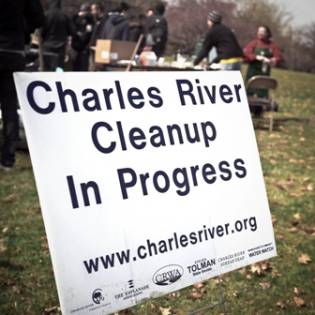Shifting Baselines are a Double-Edged Sword: Why Climate Advocates Must Honor Our Environmental Laws In Shaping Climate Policy
In his 1970 state of the union address, Richard Nixon said, “we still think of air as free. But clean air is not free, and neither is clean water. The price tag on pollution control is high. Through our years of past carelessness, we incurred a debt to nature, and now that debt is being called. The program I shall propose to Congress will be the most comprehensive and costly program in this field in America’s history.” President Nixon later signed bipartisan legislation establishing Environmental Protection Agency.
EPA efforts implementing laws such as the Clean Air Act and the Clean Water Act have greatly reduced pollution throughout the United States. Enforcement of the CAA has reduced aggregate national emissions of the six common pollutants by 73 percent. At the same time, gross domestic product grew by 324 percent. The CWA has had a rockier implementation – Flint Michigan still doesn’t have clean water – but has nevertheless had a significant impact on reducing water pollution.
United States. Enforcement of the CAA has reduced aggregate national emissions of the six common pollutants by 73 percent. At the same time, gross domestic product grew by 324 percent. The CWA has had a rockier implementation – Flint Michigan still doesn’t have clean water – but has nevertheless had a significant impact on reducing water pollution.
Unfortunately, Americans are already forgetting that clean air and clean water is not a guarantee or a constitutional right, due in part to the phenomenon known as shifting baseline syndrome. It suggests that something that was abnormal in the past, becomes the new normal, or baseline, for a generation of individuals, who then collectively forget the past baselines.
First explained in 1995, this cognitive theory has gained traction in the climate community to explain public antipathy towards action on climate change. It suggests that as average temperatures and associated climate effects slowly increase over time, individuals will fail to recognize the danger that the climate crisis poses, and collective action may fail to materialize as a result. Climate activists fear that no specific event will motivate action similar to the environmental crises in the 1970’s, and like a lobster in a pot of boiling water, we won’t realize what is happening until it is too late.
 Shifting baselines, however, are not limited to present climate effects, but also work to undermine public support for current environmental laws and regulations that continue to reduce pollution in the present day. In 1995, for example, EPA embarked on an ambitious project to cure 400 years of environmental degradation and make the Charles River swimmable and fishable again, pursuant to its authority under the Clean Water Act. While those goals have not fully been achieved – EPA does not advise swimming on some days, and fishermen can only catch, then release fish – the monumental efforts have reduced source pollution from raw sewage flows and have led to a 99.5% reduction in source contributions to the river.
Shifting baselines, however, are not limited to present climate effects, but also work to undermine public support for current environmental laws and regulations that continue to reduce pollution in the present day. In 1995, for example, EPA embarked on an ambitious project to cure 400 years of environmental degradation and make the Charles River swimmable and fishable again, pursuant to its authority under the Clean Water Act. While those goals have not fully been achieved – EPA does not advise swimming on some days, and fishermen can only catch, then release fish – the monumental efforts have reduced source pollution from raw sewage flows and have led to a 99.5% reduction in source contributions to the river.
As a transplant to Boston, I was shocked to learn that the Charles has such a toxic history. And it is possible, if not probable, that an entire generation of Bostonians will grow up taking this privilege for granted. It may even be easy, based upon the unqualified success of the river cleanup, to forget the substantial sacrifices made and costs incurred in restoring the Charles.
This intergenerational failure to maintain understanding of past action in an environmental context may present a barrier to action on climate change. If the public discounts past costs to safeguard our water and air or the costs of maintaining environmental quality, the harder it will be to take new action. The public will not be ready to accept the significant costs required to tackle the climate crisis.
This is why it is imperative for climate advocates to not discount our existing environmental laws, but to actively celebrate their successes. It is incumbent on our present leaders and policymakers to stress how far we have come to clean the environment. They must frankly and openly discuss the means we took to get here. And they must stress that it is in our power to once again make the difficult decision to invest time, energy, and significant sums of money to clean our environment. We are not working from a blank slate in the climate fight.
Unfortunately, it seems that even our legislators pursuing climate action view climate solutions as separate and distinct from the long history of environmental action. For example, the Green New Deal discusses the World War II and New Deal mobilizations but fails to mention the bedrock environmental laws of the 1970s or the decades of subsequent pollution abatement.
We face severe environmental and public health challenges. We are not on track to keep global temperatures below 2 degrees Celsius. Sea level rise threatens our coasts. Ocean acidification will virtually eliminate all coral reefs and their priceless biodiversity and threaten coastal fishing communities’ livelihoods. It may be easy to abhor the cost of action, but we have not only known for fifty years of the cost of a clean, resilient, and sustainable environment, we accepted those sacrifices. It is time to embrace that history, rather than run from it.
 Joshua Williams anticipates graduating from Boston University School of Law in May 2021.
Joshua Williams anticipates graduating from Boston University School of Law in May 2021.

